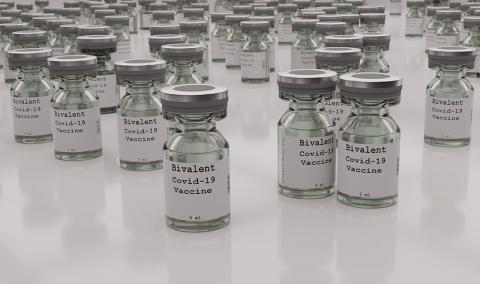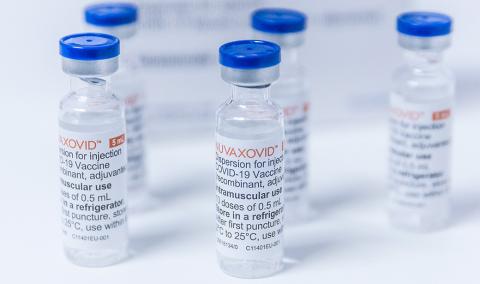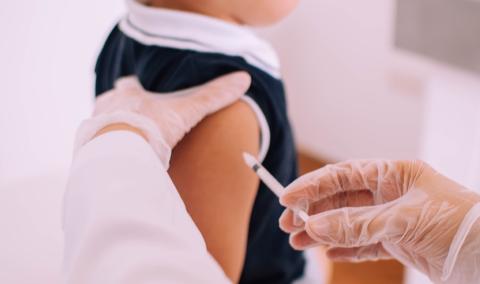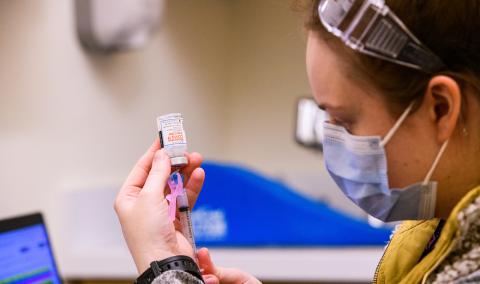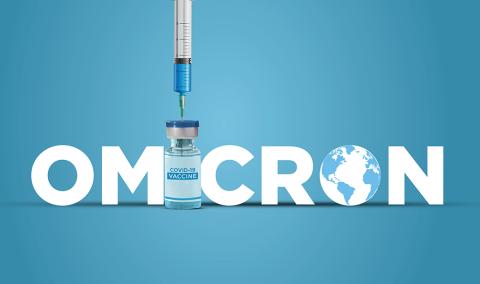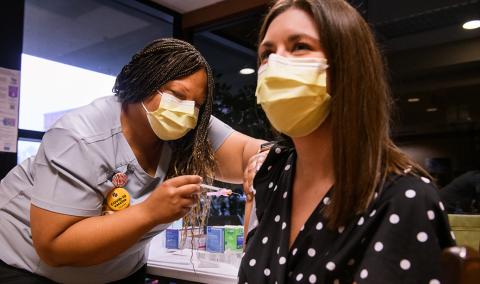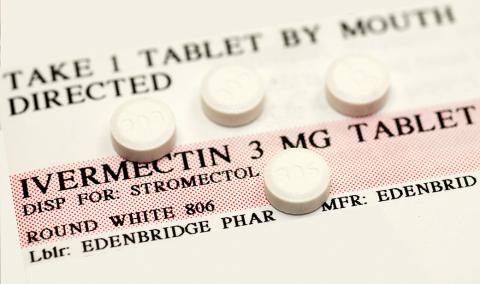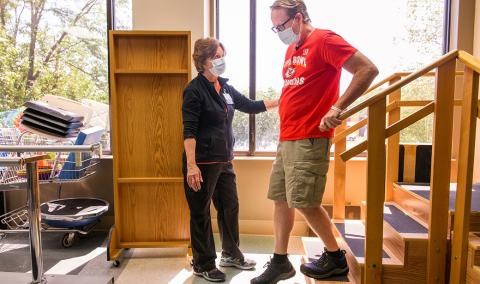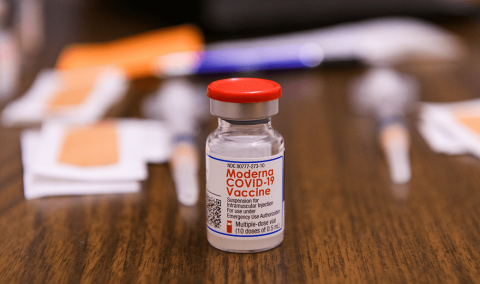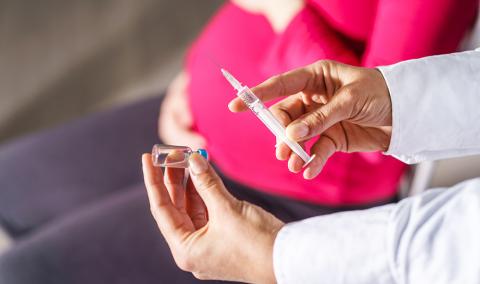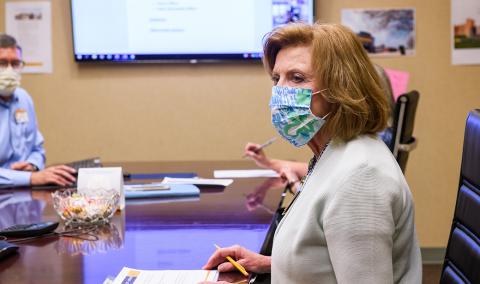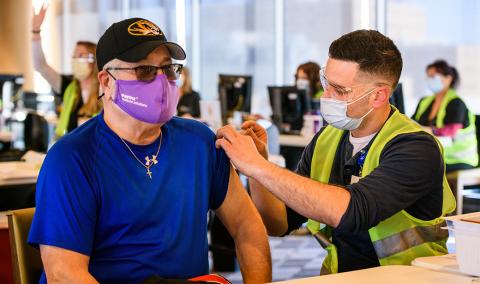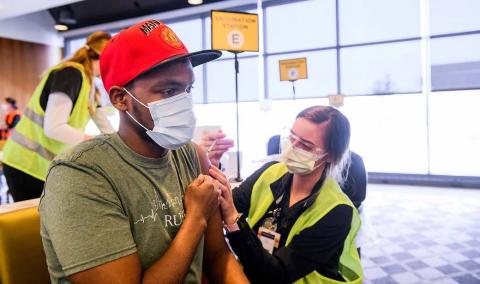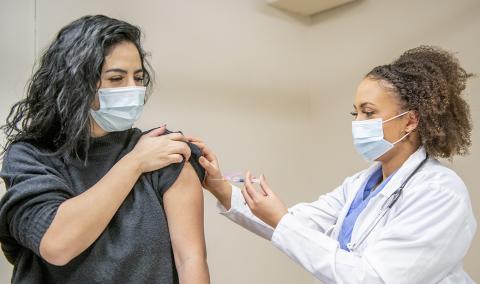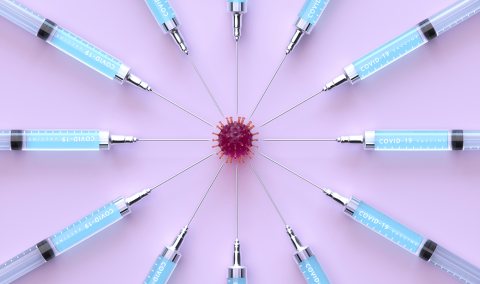The key to effectively managing coronavirus is vaccination.
There are three vaccines authorized for use in the United States for the 2024-25 season to prevent COVID-19. Current evidence-based public health guidelines state that everyone 6 months and older should get a 2024-25 COVID-19 vaccination, including those who have received a COVID-19 vaccine before and those who have had COVID-19. Vaccination is the best way to protect yourself from the current variants
How to Get the COVID-19 Vaccine
There are many COVID-19 vaccinators in our community, and the easiest way to find one near you is by visiting vaccines.gov.
MU Health Care offers several ways to get the 2024-25 COVID-19 vaccine.
For ages 6 months to 4 years:
- For children ages 6 months through 4 years, please call your child’s provider to schedule an appointment.
For ages 5 years and older:
- Select clinics are scheduling vaccination appointments for existing patients only. Call your doctor's office to schedule an appointment.
- MU Health Care is offering the current COVID-19 vaccine at some flu vaccination events. Information regarding availability can be found on our Where to Get Your Flu Shot page.
If you have questions, call 573-771-2273 (CARE) to get help finding vaccine appointments.
COVID-19 Vaccine Resources
- COVID-19 vaccine information sheet
- Pfizer fact sheet: 6 months through 11 years of age
- Moderna fact sheet: 6 months through 11 years of age
- Novavax fact sheet
How the Vaccines Work
The first two approved vaccines — Pfizer-BioNTech and Moderna — use messenger RNA (mRNA) to instruct the body to build the coronavirus’ signature spike protein. The presence of the spike protein prompts an immune system response, resulting in antibodies that can combat the coronavirus.
Those 5 years of age and older are considered up to date on the COVID-19 vaccine once they receive either one dose of the 2024-2025 Pfizer-BioNTech or Moderna COVID-19 vaccine. Children ages 6 months to 4 years may need additional doses of the 2024-2025 COVID-19 vaccine depending on how many previous COVID-19 vaccine doses they received. Learn more about the mRNA vaccines.
The third authorized vaccine is Novavax, a protein subunit vaccine. That means it uses a protein — in this case, a harmless piece of the COVID-19 spike protein — to alert your immune system to recognize and fight back against the real COVID-19 virus. It also includes an adjuvant, which is a substance that boosts the level of immune response. It is the same approach that has been used for decades in the vaccines for influenza, hepatitis B and HPV.
Novavax is a protein subunit vaccine. That means it uses a protein — in this case, a harmless piece of the COVID-19 spike protein — to alert your immune system to recognize and fight back against the real COVID-19 virus. It also includes an adjuvant, which is a substance that boosts the level of immune response. It is the same approach that has been used for decades in the vaccines for influenza, hepatitis B and HPV.
Novavax is authorized under Emergency Use Authorization for people ages 12 years and older. You are up to date when you receive one dose of the 2024-2025 Novavax vaccine unless you are receiving a COVID-19 vaccine for the first time. If it is your first time getting a COVID-19 vaccine, you will need two doses of the 2024-2025 Novavax COVID-19 vaccine to be up to date.
Facts about COVID-19 vaccines:
- They cannot give you COVID-19.
- They do not use the live virus that causes COVID-19.
- They do not affect or interact with your DNA in any way.
Learn the difference between vaccine myths and facts.
Are the Vaccines Safe?
The vaccines have passed the same rigorous Food and Drug Administration (FDA) standards as other vaccines. They were tested in large clinical trials — made up of tens of thousands of adults of different ages, races, ethnicities and medical conditions — to ensure they meet safety standards.
- The FDA carefully reviews all safety data from clinical trials and authorizes emergency vaccine use only when the expected benefits outweigh potential risks.
- The Advisory Committee on Immunization Practices (ACIP), an advisory panel to the Centers for Disease Control and Prevention (CDC), reviews all safety data before recommending any COVID-19 vaccine for use.
- FDA and CDC continue to monitor the safety of COVID-19 vaccines to ensure even very rare side effects are identified.
You cannot get COVID-19 from the vaccines. Some participants in the trials did report side effects similar to mild symptoms of COVID-19 infection, including muscle pain, chills and a headache. Serious reactions were rare.
How Much Does the Vaccine Cost?
Most people can get no-cost updated COVID-19 vaccines through their private health insurance, Medicare and Medicaid plans. Uninsured individuals may be able to find the 2024-2025 COVID-19 vaccine available through their state or local health department immunization programs.
How to Access Your Vaccine Verification
If you received your vaccine through MU Health Care you can access your vaccine verification through HEALTHConnect, either online or in the app. (Get the app.)
- Log in to HEALTHConnect.
- Click on Results.
- Click on COVID-19 Results.
- Click on "View Vaccine Verification" under COVID-19 Vaccine Verification.
- You will have the option to print your vaccine verification or scan the QR code to save it on your phone.
Other Ways to Get Your Vaccine Record
If you were vaccinated at MU Health Care, complete the records authorization form and follow directions on the form to submit to medical records.
Vaccine records also are available from the state of Missouri and can be requested via email or fax. Complete the Missouri Record Request form and email to ImmunizationRecordRequests@health.mo.gov or fax to 573-526-0238.
More Frequently Asked Vaccine Questions
Q: Who should get vaccinated?
A: Everyone ages 6 months and older should get the 2024–2025 COVID-19 vaccine. The COVID-19 vaccine helps protect against severe disease, hospitalization and death. It is especially important for patients: 65 and older, at high risk for severe COVID-19, and who may have never received a previous COVID-19 vaccine dose.
Q: What if I’ve already had COVID-19?
A: If you have already had COVID-19, you still benefit from the vaccine. See below on timing of when you should consider vaccination.
Q: If I’ve had COVID-19, how long do I need to wait to get vaccinated?
A: People who recently had COVID-19 may delay getting a COVID-19 vaccine for 3 months as the risk of getting COVID-19 is less likely following an infection. However, certain factors may be reasons to get a vaccine sooner such as personal risk of severe disease and risk of COVID-19 in a family member or close contact.
Q: What if I’ve recently received the 2023-2024 COVID-19 vaccine?
A: For most people, the minimum interval between the last 2023-2024 COVID-19 vaccine and the new 2024-2025 formulation is two months. However, there are exceptions for those completing an initial series and patients with who are moderately to severely immunocompromised.
Q: Should pregnant people take the COVID-19 vaccine?
A: According to the Centers for Disease Control, COVID-19 vaccination during pregnancy is safe and effective. Everyone ages 6 months and older is recommended to get the updated COVID-19 vaccine, including people who are pregnant, breastfeeding a baby, trying to get pregnant now, or who might become pregnant in the future.
Q: Should I wait after getting another vaccine to receive a COVID-19 vaccine?
A: Consistent with CDC guidelines, there is no need to wait to receive the COVID-19 vaccine if you have received another vaccination.
Q: What are common reactions to the vaccine?
A: Most reactions are mild to moderate and are similar to side effects seen with other immunizations. These can include fever, soreness at the injection site, or even a temporary flu-like feeling with muscle aches, headache or fatigue.
Q: What if I have a reaction to the vaccine?
A: Some people might develop temporary flu-like symptoms, including fever, shortly after the second dose. This reaction is not an infection or sickness but is part of the immune system’s reaction to “seeing” the proteins from the vaccine.



